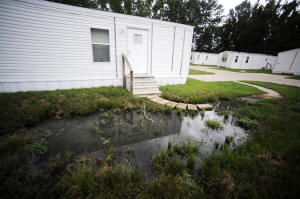DOJ ends environmental justice agreement in Alabama county citing Trump
[April 12, 2025]
By KIM CHANDLER and SAFIYAH RIDDLE
MONTGOMERY, Ala. (AP) — The U.S. Department of Justice announced Friday
that it is ending a settlement agreement regarding wastewater problems
in a rural Alabama county where most residents are Black, closing an
environmental justice probe launched by the Biden administration.
Justice Department officials said they were ending the agreement reached
with the state regarding wastewater issues in Lowndes County. Federal
officials said the decision follows President Donald Trump’s executive
order forbidding federal agencies from pursuing diversity, equity and
inclusion initiatives.
“The DOJ will no longer push ‘environmental justice’ as viewed through a
distorting, DEI lens,” Assistant Attorney General Harmeet K. Dhillon of
the Justice Department’s Civil Rights Division said in a statement.
“President Trump made it clear: Americans deserve a government committed
to serving every individual with dignity and respect, and to expending
taxpayer resources in accordance with the national interest, not
arbitrary criteria," the statement said.
U.S. Attorney General Pam Bondi in February issued a memo rescinding a
Biden-era directive to prioritize environmental justice cases.

Wastewater sanitation issues are well-documented in Lowndes County.
Poverty, inadequate infrastructure and a type of soil that makes it
difficult for traditional septic tanks to work have sometimes left some
residents with sewage in their yards.
The Justice Department in 2023 said its probe found Alabama engaged in a
pattern of inaction and neglect regarding the risks of raw sewage for
county residents. The Alabama Department of Public Health agreed to take
several steps as part of the settlement, including not fining people
with inadequate home systems, creating a comprehensive plan for the
region and other steps.
The agreement was the result of the Justice Department's first
environmental justice investigation under Title VI of the Civil Rights
Act of 1964.
[to top of second column]
|

Fetid water pools outside a mobile home in a small mobile home
park in rural Hayneville, Ala., Lowndes County, Aug. 1, 2022. (AP
Photo/Jay Reeves, File)

U.S. Rep. Terri Sewell, a Democrat whose district includes the
county, criticized the decision to end the agreement.
“It was about addressing a public health crisis that has forced
generations of children and families to endure the health hazards of
living in proximity to raw sewage, as the DOJ itself documented,"
Sewell said.
She said that the Trump administration "has put its blatant
disregard for the health of my constituents on full display.”
Dr. Scott Harris, Alabama’s state health officer, said his
department will continue its work in the region. But he noted that
work and efforts to help install new septic systems at homes is
dependent upon federal and state funding. American Rescue Plan funds
helped provide money for new septic system installations.
“It doesn’t change our intent to help as many people as possible,”
Harris said. “The real question is going to be what the funding
situation looks like.”
Catherine Flowers, an activist who brought attention to the problem
in the county, said wastewater sanitation is a problem in many rural
areas.
“I pray that today’s action means that this administration will make
sanitation a priority for all who are affected throughout rural
America,” Flowers said.
All contents © copyright 2025 Associated Press. All rights reserved |